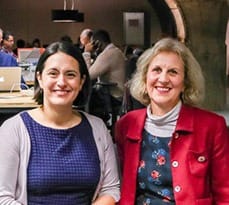
Many hospitals across the UK are struggling with a “postcode lottery” when it comes to accessing donor human milk for premature babies in their neonatal units. Some resort to rationing supplies between the very sickest preterm babies because they can’t get sufficient supplies.
Through a newly launched app and army of volunteers, the not-for-profit organisation The Hearts Milk Bank (HMB) seeks to help solve this problem by making it easier for women to donate breast milk. Co-founded by Dr Natalie Shenker and Gillian Weaver in 2016, the Hertfordshire-based HMB was supported by the Cambridge Social Ventures programme at Cambridge Judge Business School’s Centre for Social Innovation.
“At the moment donors face quite a lengthy recruitment process, but if you’re a new mum looking to do something altruistic, you really want the process to go quickly and smoothly,” says Natalie. “We hope this will be the first of a series of apps that will make the whole process really convenient, really simple and bring donating milk into the 21st century.”
Applying to become a donor is simple: prospective donors complete an initial health questionnaire, just as if they were donating blood to a blood transfusion service. This is checked by the HMB team, and the potential donor is sent a blood screen pack by post. Once the potential donor has been approved, they’re sent a donor kit, and when their milk is ready to collect, they use the app to arrange for their donation to be collected by volunteer drivers who also courier emergency blood products.
By limiting paperwork and telephone queues, the app automates the process for milk donors, shortening the time it takes for to register and donate – and hopefully resulting in HMB being able to process more donors and more milk. “Given that most women donate 5 or more litres, and premature babies only need 25 to 50ml a day, each donor will have a huge impact,” says Natalie.
Denise Howlett, a new mother and HMB milk donor, has been successfully using the app since last year. “I found the app very easy to navigate and use,” she said. “The layout on the screen is very clear, and I found it very quick to book a pickup slot.”
Beyond its role as a milk bank, HMB is carrying out studies into milk banking processes and other issues relating to breastfeeding in their labs, which are owned by the University of Hertfordshire. A long-term goal is to have a positive impact on the health outcomes of premature, sick and vulnerable infants, while also supporting breastfeeding in hospitals and the community. Working with researchers at Imperial College in London, the team aims to establish a research biobank of 20,000 breast milk samples, collaborating with scientists across the fields of nutritional analysis, cancer research and other disciplines.
HMB was a Gold Winner last year in the MassChallenge UK global startup accelerator, winning £10,000 to invest in the venture. HMB currently has more than 60 donors going through screening, but say they are on track to recruit at least 150 women by the end of 2018.
“HMB operates on the tricky intersection of the public sector and individual and community action,” says Belinda Bell, Programme Director at Cambridge Social Ventures.
“The team’s ability to navigate the inherent ambiguities in this area has resulted in HMB getting off to a remarkable start and directly impacting on babies’ lives. This type of social innovation, backed by a sustainable financial model, takes remarkable skill and nuanced understanding of the stakeholders involved. We’ve loved working with this team and can see the potential impact scaling significantly over the months and years ahead.”
As the service develops, Natalie hopes that blood screening will be offered locally at community breastfeeding support groups to speed up that part of the donor application process. Looking ahead, she hopes the HMB service, now focused on London and the southeast of England, can be rolled out nationwide to help end the postcode lottery.
This article is part of Venturing Forth, our new series on the aspirations and challenges of ventures connected to students, alumni and others associated with Cambridge Judge Business School.


